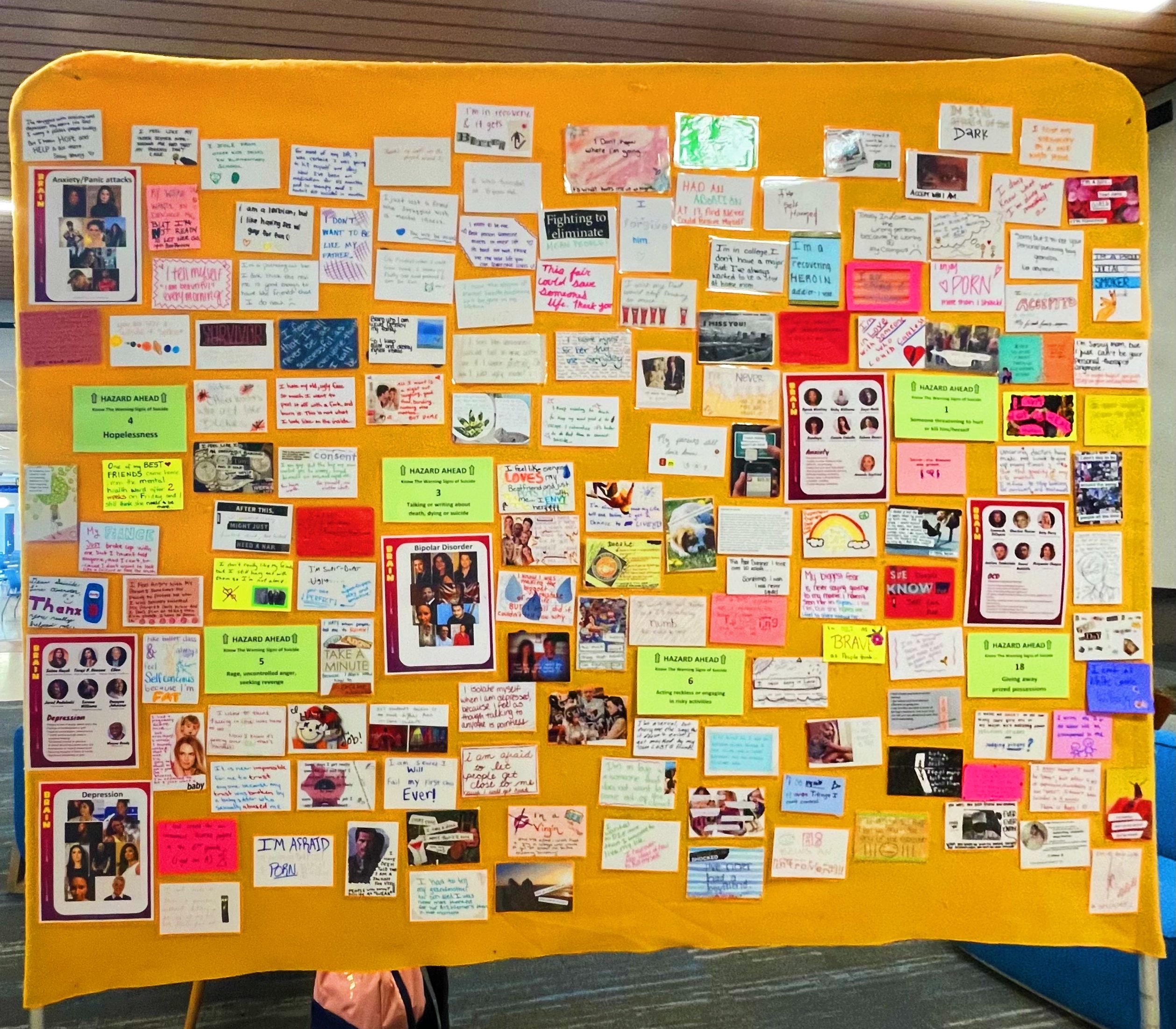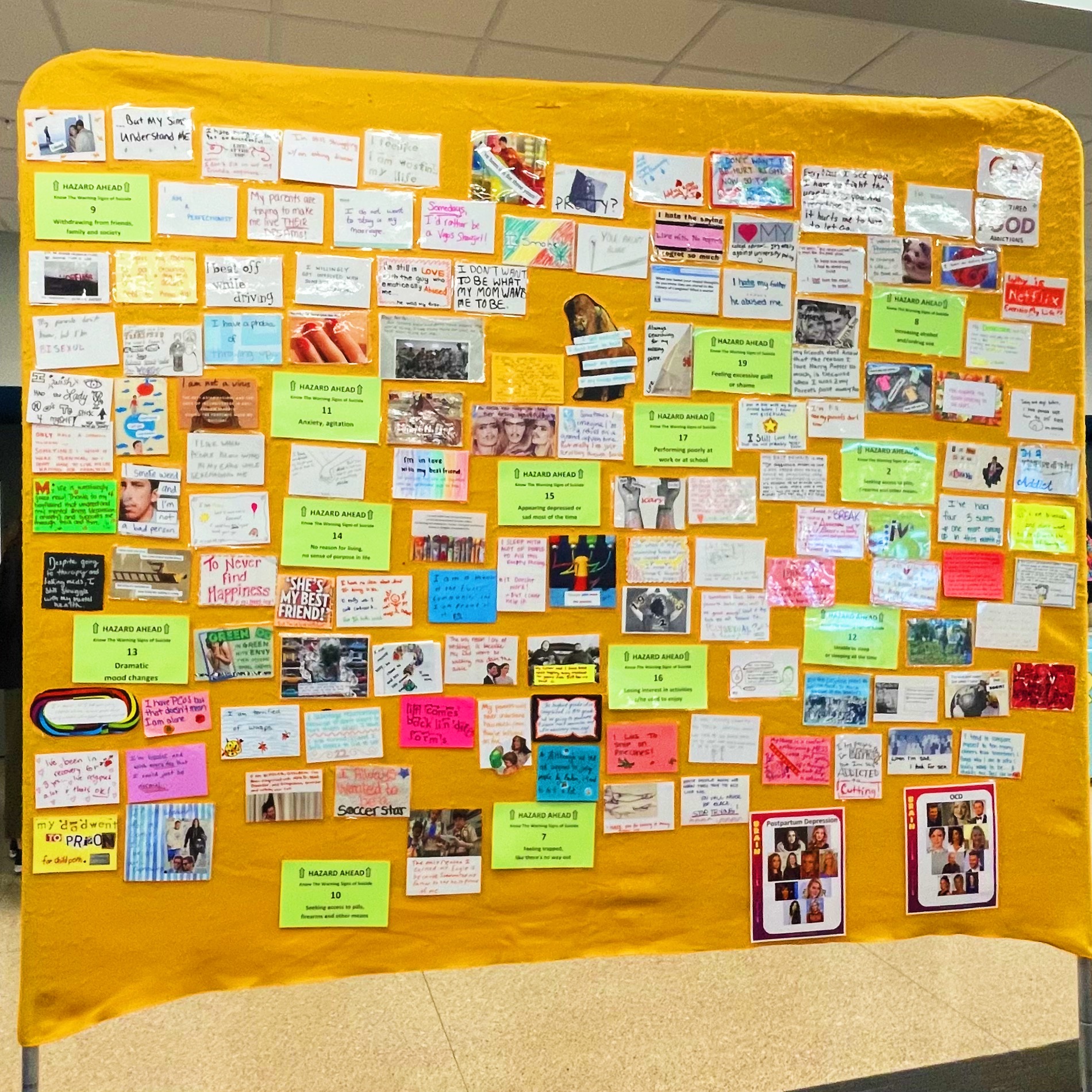For months and now years, the COVID-19 pandemic has terrorized the globe and abruptly digitalized the world we once knew. It’s no secret that COVID-19 had and continues to have drastic effects on community camaraderie and individuals’ mental health.

To strengthen the community, and provide resources and support to students, I’mAlive held a mental health fair on campus Wednesday afternoon, hosted by the Associated Student Government (ASG).
“Our goal is to give and show students that they have access for mental health support here; for counselors, and to just bring our group of students here together as a community,” said Adrianna McEachern, the ASG Outreach Programmer, “overall, hopefully to achieve bettering their mental health.”
McEachern is responsible for bringing I’mAlive to campus to engage and inform the Bigfoot bunch on the influence mental health holds. She describes the effect that mental health stressors can have in combination with education.
“I think [mental health] affects [education] big time.” stated McEachern, “It’s really hard to focus on schoolwork and concentrate on stuff when you’re down and out, and your mind isn’t fully there.” Offering guidance to her peers, “my advice would be, is to do things that help your mental health. So go on walks, listen to music, just enjoy things you love.”
To create this safe and enjoyable environment to promote mental wellness, McEachern works to ensure that every student understands that they are welcome and supported.
“There is a place for them at SFCC.” stated McEachern. “We have resources. If anybody needs, we’re available to talk. I guess, just keep each other close.”
The presence of I’mAlive on campus confirms the care and willingness towards individual wellness and collective wellness of the campus.
Running Start student from Lewis and Clark, Noah Eichstaedt, attests to the importance of mental wellness co-existing with his education.
“I think the state of your mental health greatly affects how well someone can learn if it is hard for someone to get out of bed, how could they be expected to get the most out of their education?” Eichstaedt said, “As a Running Start student, your parents can’t check your grades or get any updates from your teachers so all the responsibility falls on your own shoulders. Due to this, it’s very important to maintain a good mental state in order to keep up your grades and attendance.”
RunningStart enables Junior and Senior high school students to dually enroll in both their high school and a local college simultaneously (SFCC, SCC, EWU), as an opportunity to accelerate their education. For RunningStart students, mental wellness has to stretch to cover multiple aspects of their education.
On their nomadic journey traveling the country to communicate with campuses nationally, I’mAlive is a non-profit organization originally based in Maryland. Co-Founder Elena Butler explains what they strive to accomplish.
“Our goal is suicide prevention and mental health awareness education,” she said. “The philanthropic group has been around for twenty-four years, “Since 1998, when the founder’s wife died by suicide, he created a network of crisis hotlines to make sure that fewer people won’t [turn to suicidal measures]– the goal is nobody dies by suicide. But in reality, people are still struggling, so he just wanted to create an outreach program.”
I’mAlive openly offers two programs for support and easy access to mental health resources.
“One of them is actually online,” Butler said. “It’s a chat, ImAlive.org, where suicidal people can come and talk to a trained counselor about what’s going on. The other program is [this] live Mental Health Fair where the goal is to engage the students into a conversation about mental wellness, see how they’re doing, check if they are not aware that there’s counseling available on campus, and connect them to their local resources.”
Bigfoot students were met with a plethora of activities to exercise their mental wellness. Multiple stations at the fair included educational and interactive ventures.
“The ‘brain station’ where students match different mental health diagnoses with their symptoms, Graffiti art, where students write a positive message, or inspirational quotes,” said Butler. “Another station is that depiction where students are read statements about suicide and suicide prevention, and they try to guess if it’s true or false. Then the last station is ‘share secrets’, where students are sharing their deep secrets that maybe they have never shared with anybody else.” Butler explains that participants can anonymously “read secrets from students all around the country, and they can share their own.”
While some might shrivel at the thought of exposing their personal confessions, Butler offers a gentle reminder that secrets tend to be more alike than one would think.
“You will notice that secrets are very similar across the country, actually — the world. People are struggling with depression, anxiety, suicidal thoughts. People have been really isolated during the pandemic.” Indeed, the pandemic heightened and created intense emotional stress globally, while forcing isolation upon individuals. Butler conveys her gratitude for being able to connect with students in-person once again, “it’s nice that they’re holding a face to face event, finally after two years. The need for mental health support is there.”
As much as there’s a need for mental health support, there is just as much assistance available. Never be ashamed to ask for help, there are resources at SFCC, and I’mAlive, eager to help you.
SFCC Counseling:
Building 30, 2nd floor
Schedule an appointment or get info at sfcc.spokane.edu/For-Our-Students/Getting-Help/Counseling
I’mAlive:
Online support chat at ImAlive.org

